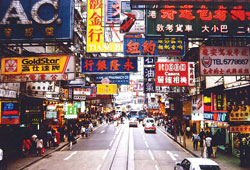 Huge signboards hang precariously above streets teeming with pedestrians, all miraculously obeying the traffic signals, as double-decker buses barrel through intersections without honking or hitting anyone. Rush hour subways, packed with commuters who never spit, shove or eve-tease, convey us across town in minutes for dinner with old friends, featuring mysterious dishes we regret asking about. This could only be Hong Kong, the city of dreams on fast-forward, where time is money and I'm the only one running late for appointments.
Huge signboards hang precariously above streets teeming with pedestrians, all miraculously obeying the traffic signals, as double-decker buses barrel through intersections without honking or hitting anyone. Rush hour subways, packed with commuters who never spit, shove or eve-tease, convey us across town in minutes for dinner with old friends, featuring mysterious dishes we regret asking about. This could only be Hong Kong, the city of dreams on fast-forward, where time is money and I'm the only one running late for appointments.
After imperial Britain seized the barren island called Fragrant Harbour in 1841, the sole reason most people came to this free-port devoted to laissez-faire economics was to make a buck, and the Hand is no exception. Fortunes were made by British firms and their Chinese suppliers in everything from silk to opium, arms to toys, turning Hong Kong into China's outlet to the world. Shanghai industrialists fled to this safe-haven when the People's Republic was declared in 1949, bringing their capital and expertise, while the poor escaped famine and upheaval in the provinces and provided cheap labour for the factories.
The well-heeled descendants of these refugees now crowd the high-end shopping malls, and no one worries much about the past. There was a time when the Orientalist in me would have taken offence at the suggestion that Kathmandu had anything to learn from this paragon of consumerism and avarice. Hong Kong has always been about money and very little else, while Nepal had abiding spirituality and rich culture. Hong Kong is a new city, constantly tearing down and reinventing itself, while Kathmandu boasted ancient temples and a brilliant architectural tableau. If we copied such a place, all we'd be left with is ugly glass and concrete and a bunch of greedy materialists.
Well, anyone who still agrees with this sentiment hasn't been downtown for awhile. Since Kathmandu's heritage and social cohesion has already been sacrificed to haphazard modernisation perhaps we can learn something from Hong Kong and its people, who also wrecked their heritage but at least got rich doing so.
Recent conversations with local friends centred on the tenth anniversary of the handover from the old colonial regime to the new. Fears that China would govern with a heavy hand have long dissipated, and though no one yearns for the old days nor feels any loyalty to the British Empire, all value the sanctity of the individual and rule of law that stands as the greatest colonial legacy.
The Brits never seriously considered granting democracy to the rabble, much like the new masters in distant Beijing; the territory's chief executive and top bureaucrats are chosen by a secretive cabal guided by the central Politburo. Citizens express concern over irksome details like the promotion of Mandarin over Cantonese and withdrawal of subsidies for English-medium schools, but most accept political manipulation as long as the economy is left alone.
Many say it was actually Hong Kong that took over China, as its well educated entrepreneurs fanned out in search of opportunities, teaching the skills of international trade to unsophisticated mainlanders emerging from decades of deluded policies. Needless to say, the Chinese are quick learners, proven by the free-for-all across the border as communism is hastily abandoned and unbridled capitalism feverishly embraced.
We already know prosperity defuses social tensions, but transparency and the rule of law play essential roles in allowing everyone a shot at improving their lot in life. HK's burgeoning middle class got where they are primarily through hard work, but were greatly helped by the lack of government interference in the economy, a low tax rate fairly applied, an independent judiciary, and a vibrant free press. An environment that guarantees impartial justice for all encourages investment and risk-taking that creates jobs, the answer to most of our problems here in Nepal.
Typically, we're heading in the opposite direction. The judiciary can be bought by the highest bidder, leftist forces punish business with militant unionism and extortion, and efforts to muzzle the media are intensifying apace. If Hong Kong represents a more modern, open approach, Kathmandu doggedly pursues protectionist policies that failed long ago everywhere else, ensuring that factories close, jobs are lost and the economy continues in free-fall.


